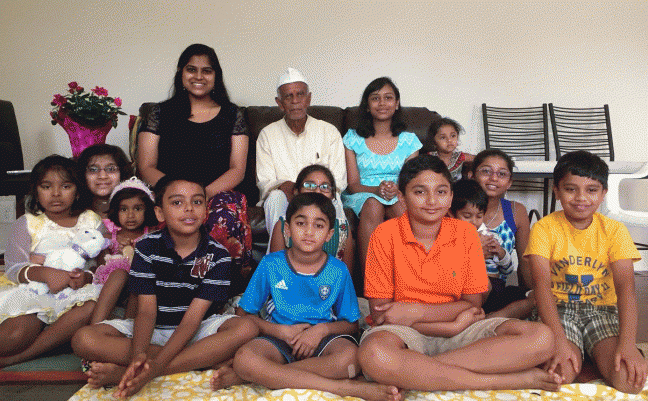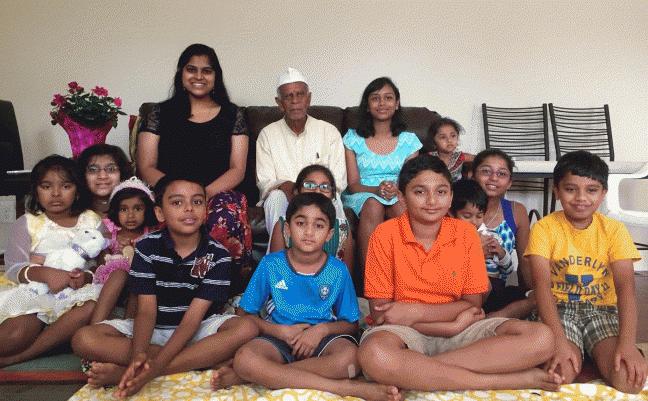BY NISHA KASHYAP
August 15, 1947: the date that marks the end of the Indian freedom struggle and the beginning of a free and independent India, the date that sparks a feeling of pride and joy in every Indian, and for some, the date that raises questions about the Indian Independence Movement. As an Indian-American, my knowledge of the Indian freedom struggle is limited to what little I have been taught in school or have heard from my parents and grandparents, neither of whom have first hand accounts. Thus they cannot retell the story ofIndia’s independence in its entirety nor with the details that we curious third-generation Indian children seek.
Therefore, when presented with the opportunity to speak with an actual Freedom Fighter, who actively took part in the Indian Independence movement, I simply could not resist. Who better to recount life prior toIndependence, than someone who witnessed it all first hand? I approached Sulebele Rangappa Ramaiah buzzing with questions and left a few hours later feeling enlightened.
A little bit of a background: Sulebele Rangappa Ramaiah or Suram Ramaiah is well-known for his service in the field of education and social programs for the welfare of society. He was born on July 17, 1919 in Sulebele, Karnataka to farmers. Inspired by revolutionary thinkers such as Mahatma Gandhi and Swami Vivekananda, Ramaiah fully immersed himself in the Indian Freedom Movement. He began his involvement by distributing pamphlets containing speeches by the leaders of the freedom movement. His participation in leading anti-British activities, including the burning of foreign goods and protesting cow slaughter, led to his imprisonment. Devoted to his cause, Ramaiah did not let the fear of imprisonment inhibit him and participated in the 1947 ‘Chalo Mysore’ movement. Post-Independence, he went on to win the Karnataka Legislative Assembly elections in 1957, and earned the title of MLA of Hoskote. That same year, Ramaiah implemented his determination to start theVivekanandaHigh Schoolin Sulebele. His work and service towards society and education have won him several accolades and awards. In addition, Ramaiah is one of the 150 participants of the Indian Freedom Movement who have been chosen by the government ofIndiato commemorate the Indian Independence day and be recognized by the President of India on August 9, 2015.
Some excerpts from my interview with Ramaiah.
What pushed you to become actively involved in the Indian Independence Movement?
Seeing the British atrocities such as the slaughtering and consuming of cows, the effects of British liquor stores on my people, the abusing of the juice from Arrack trees (trees similar to coconut trees known for producing liquor) made me feel that I had to do something. As a young man, I would also see leaders of the movement giving speeches in the town square, which motivated me to join the movement.
How were you involved?
I helped distribute pamphlets, cut telephone lines, and broke railway tracks (He said laughing). I attended protests and listened to speeches by the movement leaders, who came from all overIndia. I also took part in the ‘Chalo Mysore’ movement and the Mysore Blackout.
What was the punishment of such acts?
I was caught, taken to the police station, and then put in jail. We never had a trial. There were hundreds of us [protestors] but not a single known leader. We were all suddenly transported to theMysorejail. There we were given food that had not been sorted of rocks or bugs. We could only sort through the food so much before giving up altogether. One day, after we could no longer endure this treatment, we decided to strike. We refused to eat the food and threw it aside. We left our barracks and sat in front of the gates. Then the police came and beat us, even killing one person. I was in the jail for one month, by thenIndiagainedIndependenceand I was released.
What was India like after Independence?
The British did not simply leave India. They left us to fight amongst ourselves. Sure we were free, but the remaining Kings were left to fight for power,Indiawas divided intoPakistancausing more fighting.
Seeing India today, what do you feel? Are we properly using our freedom?
I am hurting. Prior to gaining freedom, all of the leaders would have training camps in which they discussed the necessary course of action to take after gainingIndependence. They sought to lead with integrity and high morals. Today, the decreasing of integrity and morality saddens me. There is still so much to be done. Our people still suffer, there is still a vast disparity in wealth, there are still cheap political scams.
Despite being 97 years old, Ramaiah continues to use his voice and dedicate his time to making a difference. As stated above, he started the VivekanandaHigh Schoolin Sulebele to offer village children a closer means of education as they would otherwise have to walk approximately 15 kilometers to attend the nearest high school. He and his school have overcome all obstacles, including a lack of space and personal threats towards teachers, to flourish from just 50 initial students to now nearly 1,500. If you would like to support his school contact S.R.Ranganath (President, Vivekananda Education Society Ph: +91-94489-72097
Email: suram.ranganath@gmail.com) for more information.
After meeting with Sulebele Rangappa Ramaiah and hearing his story, I was motivated to reflect on my own life. I found myself feeling conflicted: growing up in America, we often neglect our past and focus solely on our present. We are all so preoccupied with our own everyday struggles, whether it be getting natural A’s in AP classes or balancing multiple extracurricular activities, that we fail to get in touch with our culture and our colorful past. Ramaiah’s story is our story as well. It is because of the efforts and the sacrifices of countless men and women such as Ramaiah, that we are blessed with the privileges to take those AP classes and excel in those extracurriculars today. Sure, we have all been told to “ be grateful for what we have” and to “think about the sacrifices of our ancestors before being ungracious”; but it is not enough to simply acknowledge our past and the opportunities given to us, we must actively participate in our future by reconnecting with our past. We must all step forward by taking a step back into the past. Thus, I encourage all of the other third-generation Indians to join me this Independence Day in paying homage to the heroic men and women who took a part in the Indian Independence Movement, to find a cause and to fight for it, and to uphold our culture by continuing the story of India.






